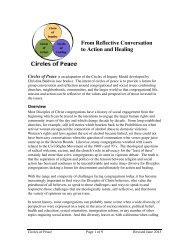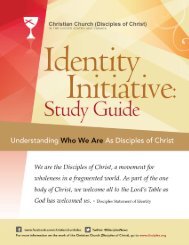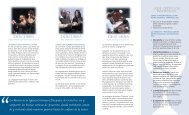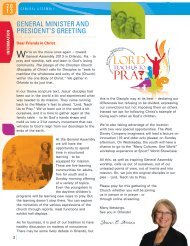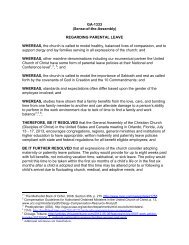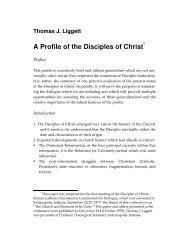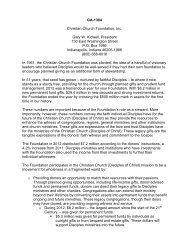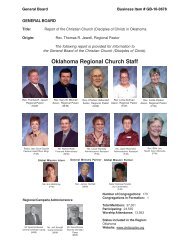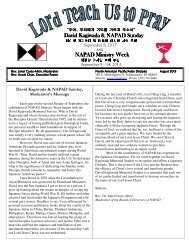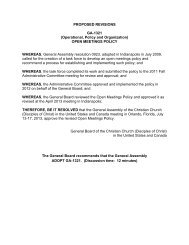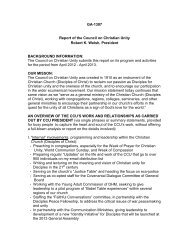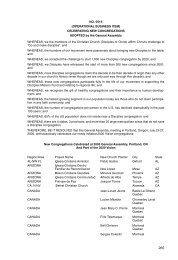RESOURCING THE CHURCH FOR ECUMENICAL MINISTRy A ...
RESOURCING THE CHURCH FOR ECUMENICAL MINISTRy A ...
RESOURCING THE CHURCH FOR ECUMENICAL MINISTRy A ...
Create successful ePaper yourself
Turn your PDF publications into a flip-book with our unique Google optimized e-Paper software.
Christian Churches Together in the USA, and<br />
Churches Uniting in Christ). For a communion<br />
relatively small in numbers, this is remarkable.<br />
There is more. Disciples participated honorably in<br />
the missionary expansion of the Church in the 19th<br />
and earlier 20th centuries in India, Africa and Asia.<br />
But in recent years they have actively encouraged<br />
these mission-founded churches, and others in<br />
Europe and Australasia with Disciples’ heritage, to<br />
enter church unions. The United Church of Christ<br />
in Thailand, the Church of Christ in the<br />
Democratic Republic of Congo, the United<br />
Reformed Church in the United Kingdom—these<br />
and more embody the Disciples commitment to the<br />
visible unity of the Church. Disciples have also<br />
fostered many local, national and regional councils<br />
of churches, for example in the USA and in India.<br />
And more: though Disciples in the US have not<br />
entered into a church union, they have formed a<br />
far-reaching partnership with the United Church<br />
of Christ in the US. In an arrangement which may<br />
be unique worldwide, the two churches have<br />
established a common board for world mission. For<br />
Disciples this has truly been a century—and more—<br />
of witness to the cause of the unity of the church.<br />
Why spend time and energy—not to mention<br />
financial resources—in reviewing our<br />
ecumenical present and future? Should we<br />
not just congratulate ourselves, and continue<br />
on as we are?<br />
Ironically, the very intensity and depth of our<br />
ecumenical engagement prompts the following<br />
questions: Given that we are so engaged and<br />
prominent ecumenically, why another “visioning”<br />
conference on Disciples’ ecumenical life? Why<br />
now? Why spend time and energy—not to mention<br />
financial resources—in reviewing our ecumenical<br />
present and future? Should we not just congratulate<br />
ourselves, and continue on as we are? The planners<br />
of this conference had the courage to answer, “No.”<br />
They recognized that the life of our church, and of<br />
the ecumenical movement, is a journey, a work in<br />
progress. They recognized that it is precisely when<br />
things are going well that one is tempted to forget<br />
this, that one must constantly re-examine and reevaluate<br />
the situation.<br />
The fact is that our own church is changing, and it<br />
Best • The Journey Ahead<br />
58<br />
is essential to review our ecumenical life in view of<br />
that. It is imperative that we involve a wider range of<br />
persons—not just a loyal group of professional<br />
ecumenical staff and enthusiasts—in our<br />
ecumenical life. This is true in the context of local<br />
congregations, in the various regions, and within<br />
the General Ministries of our church. And it is all<br />
the more important as the present generation of<br />
leaders approaches retirement, and the next<br />
generation has to be widely won to the cause.<br />
Thankfully our church is being enriched by new<br />
populations of Disciples, both from within the US<br />
and from around the world; this is a blessing, but<br />
for many of these new Disciples the ecumenical<br />
cause is not self-evident, and the ecumenical case<br />
has to be argued anew.<br />
For many of these new Disciples the<br />
ecumenical cause is not self-evident, and the<br />
ecumenical case has to be argued anew.<br />
It is also important to re-examine our ecumenical<br />
life because the ecumenical movement itself is<br />
changing. Some have said that it has suffered due to<br />
its very success—that the excitement of 100, or even<br />
30, years ago has waned as ecumenism has become a<br />
recognized “field” and the pioneering generations<br />
of enthusiasts, working too often in the face of<br />
indifference or even suspicion, have been replaced<br />
by professional ecumenists who are only too well<br />
integrated into the bureaucracy of their churches.<br />
There are many positive changes as well: churches<br />
are taking ecumenical lessons to heart; they are<br />
discovering new possibilities in their common<br />
confession, worship and witness. Fresh theological<br />
and ecclesiological insights have opened new<br />
perspectives on classic church-dividing issues. And<br />
the traditional ecumenical movement is facing new<br />
challenges as a host of new partners (today,<br />
especially evangelicals and Pentecostals) brings new<br />
concerns and issues to the discussion.<br />
A Journey of Wholeness<br />
These points bring us to the second aspect of the<br />
conference theme, a journey of wholeness, and to the<br />
results of the conference. These were summarized<br />
in a preliminary draft Report produced and<br />
discussed already during the meeting. In its final<br />
form the Report will serve as a basis for<br />
recommendations for the Council on Christian



